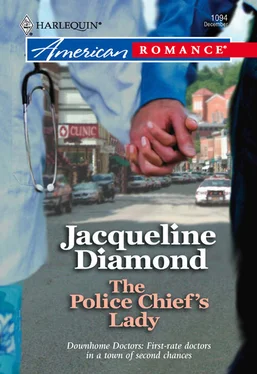“Some of them did,” Karen admitted. “It was a three-two vote. The women wanted you and the men preferred Dr. Gregory. Come to think of it, that was true for the search committee, too. It’s funny how that worked out.”
Jenni remembered the other two members of the committee quite clearly. “I’m glad I won Olivia’s approval. So the police chief disagreed. What was his name again?” She’d done her best to put it out of her head.
“Ethan Forrest.”
“Right.” She’d first seen him as she pulled her rental car into the clinic’s parking lot, twenty minutes late after a long drive from Nashville. He’d been scowling as he paced the walkway.
Even at a distance, Chief Forrest’s solid build and dark, masculine good looks had struck her. When she emerged from the car, Jenni had experienced what she called a go-back moment, an abrupt mood shift; suddenly she felt like a fifteen-year-old about to be chewed out by an adult. As a teenager, she’d often landed in trouble because she defied anyone who tried to put her down.
Ethan Forrest hadn’t scolded Jenni for tardiness. He’d even managed a smile, but not a warm one. She’d felt his brooding gaze following her the whole day as she toured the medical facilities and the town. Apparently, he’d taken a dislike to her, although she had no idea why.
“What exactly were his objections?” she asked.
After a moment’s hesitation, Karen said, “He brought up some accusation—which I’m sure isn’t true—about you and a patient’s husband.”
Jenni’s hands clenched. How dare he embarrass her publicly without even hearing her side of the story! She had to remind herself that the council had voted in her favor anyway.
“I hope nobody believed it,” she responded. “Because it isn’t true.”
“I know that!”
“Apparently, Chief Forrest doesn’t.” She decided immediately to call him by his first name as if they were equals. In some ways, they were, although she still faced probation. “What else did Ethan say?”
“Something about keeping an eye on you,” Karen admitted.
What did he think she planned to do—spend her days targeting other women’s husbands? But Jenni refused to vent her anger while talking to her new friend.
With an exercise of will, she kept her voice level as she assured Karen that she felt certain Ethan would come around. “And I promise to sound totally shocked when Mr. Rockwell calls tomorrow,” she added.
“I’m so thrilled! My friend Leah Morris—she’s a teacher—suggested we single women hold a potluck in your honor when you get here. Maybe you can share some stories about L.A. and we can clue you in about the local guys. Not that there are many worth talking about.”
“That would be great.” Jenni looked forward to meeting a supportive group of women. In L.A., she’d barely had time to keep up with her professional reading and affiliations, let alone socialize.
Her good mood lasted until she and Karen hung up. Then the information about Ethan Forrest came back to her. What was the man’s problem?
Grabbing a pillow, she whacked the arm of the couch. “Why?” Jenni demanded of this imaginary target. “Why did you try to screw things up for me? What did I ever do to you?”
She stood there, pillow in hand, overcome by another go-back moment. Ethan Forrest was a big man in Downhome and she’d be an outsider. She could picture him forever finding fault, searching for ways to turn others against her as Cousin Laura had done when Jenni, as a high school freshman, had to stay at her aunt’s house after one of her mother’s drug-related arrests.
Laura, a junior who resented having to share her home and her mother’s attention, had made life miserable for months by taunting Jenni at school. Jenni had initially tried to please her, but finally decided she’d turned the other cheek long enough.
One day, she’d responded to a gibe in kind, in front of other kids, tossing out embarrassing details until Laura fled in tears. Following her, Jenni had threatened worse if she reported the incident, and after that, Laura had left her alone.
Jenni wasn’t proud of what she’d done, but she’d felt desperate. She’d learned a lesson that day about standing up for herself.
Confronting the police chief might not be the wisest policy. However it went against Jenni’s nature to let him run her down behind her back. If he had anything to say, he had better be prepared to say it to her face.
Still stewing, she returned to her machine. Thank goodness for her flair with the needle, because she could never afford to buy a designer suit like this.
That was another life lesson she’d learned: no matter how poor you were, dressing badly made you the object of scorn. Survival had its rules, and Jenni was a survivor.
She intended to get that message across to Ethan in a manner he wouldn’t forget.
From his office window, Ethan glanced across Tulip Tree Avenue at a couple of dog walkers making their way through the central square known as The Green. On a Monday morning, the center of Downhome spread placidly before him. To his left, a dairy truck turned south at the intersection of Tulip Tree and Home Boulevard; across the street next to The Green, a couple of workmen emerged from Pepe’s Italian Diner with cups of steaming coffee.
The town didn’t appear a likely setting for a crime wave. And by city standards, the recent reports of petty thefts seemed tame. Still, Ethan found something disturbing about the reports on his desk.
“You wanted to see me?” Captain Ben Fellows, the top-ranking officer below Ethan, appeared in his doorway. Unofficially, Ben filled the role of assistant chief. A few years older than Ethan and with fifteen years on the force, he’d been in the running for the top job four years ago, but didn’t seem to resent having been passed over.
“Yes. Is Mark with you?”
“Right here” came the voice of Lieutenant Mark O’Bannon, who supervised detectives and traffic in the small department.
Ethan gestured them into seats. His office provided enough space for a few visitors as well as a bookcase, file cabinet and computer station. As for the decor, his mother, Annette, a part-time interior designer and part-time baby-sitter, had picked out the cream paint and subtle green-and-cream print curtains. He’d retained the former chief’s oversize desk, with its accumulated scars, as a tribute to departmental tradition.
“This latest report—that makes three cases,” Ethan noted. “I’d say it rules out family and friends of the victims, which means we could be dealing with a serial criminal. The fact that no one’s been hurt and property loss is minimal doesn’t change the reality that these crimes are invasive and threatening by their very nature. What do you think?”
Mark, the twenty-eight-year-old son of council member Rosie O’Bannon, deferred instinctively to Captain Fellows. Ethan was also eager to hear Ben’s insight, since the man served as pastor at the Community Church and knew the citizenry better than anyone.
“Frankly, it’s a new one on me.” Ben scratched his head. “Someone slipping into houses and stealing family portraits off the wall is weird. And I agree, somewhat scary because it seems like a hostile thing to do. The guy might have the potential for violence, especially if someone stumbles across him.”
“At first, I figured it was a prank,” Mark noted. “I assumed the photos would turn up soon.”
“We can rule that out at this point,” Ethan said. “The stories in the paper have made it clear how distressed the victims are.”
The first case had been reported a month ago. A woman returning from a shopping trip had noticed a family photo missing from her living room wall but assumed her husband had taken it down. Only when she’d asked him about it that night and learned otherwise had she remembered leaving a side door unlocked. When she’d called the cops, they’d found a couple of leaves tracked inside but no real evidence.
Читать дальше












